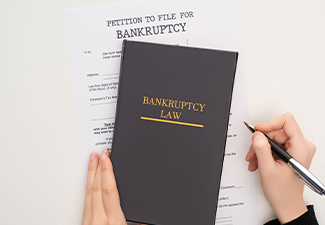Bankruptcy FAQs
June 8, 2023
 Understandably, people have a lot of apprehension and questions when they’re considering filing for bankruptcy. While this is a big decision to make, it doesn’t have to be a scary one, and in almost all cases, you’ll be better off financially after the process is completed. That said, the specifics of what bankruptcy means for you can be complicated. Below are some commonly asked questions about bankruptcy and their answers.
Understandably, people have a lot of apprehension and questions when they’re considering filing for bankruptcy. While this is a big decision to make, it doesn’t have to be a scary one, and in almost all cases, you’ll be better off financially after the process is completed. That said, the specifics of what bankruptcy means for you can be complicated. Below are some commonly asked questions about bankruptcy and their answers.
To speak with a bankruptcy attorney in the Falls Church or Alexandria areas, reach out to our team at Vivona Pandurangi, PLC. We’re able to represent clients throughout the area, including Arlington County, Fairfax County, Prince William County, and Loudon County.
Bankruptcy Frequently Asked Questions (FAQs)
How do the various chapters of bankruptcy differ?
The type of bankruptcy you file will depend on your income, goals, and whether you’ll be filing as an individual or as a business. The two most common options for an individual are Chapter 7 bankruptcy and Chapter 13 bankruptcy, while Chapter 11 bankruptcy is typically reserved for businesses and corporations.
Which chapter should I file under?
Most individuals will file under Chapter 7, also called “liquidation” bankruptcy. Chapter 7 requires you to sell off any non-exempt assets and use these proceeds to pay off your creditors before a judge will discharge any remaining debt (though it’s worth noting that most Chapter 7 filers won’t have any assets that fall under this category). This option also requires you to meet certain income requirements. If you exceed these income limits or you want to protect your assets, you may want to opt for Chapter 13, which establishes a repayment plan for your debts and allows you to keep your assets.
Can I keep my house and car if I file for bankruptcy?
This depends, but in most cases, you can. When you file under Chapter 7, your assets will be evaluated to determine which you’re allowed to keep, and this is typically anything that’s considered reasonably necessary, like your car and home. However, if you have multiple vehicles or considerable equity in your home, they may not be exempt. In this case, you should consult with your attorney about filing for Chapter 13 instead, which will allow you to hold on to these assets.
Does bankruptcy stop creditor calls?
Yes. When you file for bankruptcy an automatic stay will be placed on your accounts. This means that creditors must immediately stop all efforts to collect payments from you.
How long does bankruptcy appear on a credit report?
It should be said that filing for bankruptcy will negatively affect your credit score. That said, in the long run, you’ll be far better off. When filing Chapter 7, you can expect it to stay on your credit report for up to ten years, while most Chapter 13 filings last for up to seven years.
What if creditors aren’t respecting my bankruptcy discharge?
If you’re still receiving creditor calls after filing, you should contact your attorney as soon as possible. This is illegal, and you can and should file a complaint against them.
Do I need a bankruptcy attorney?
Technically, you can file for bankruptcy on your own without the assistance of a lawyer, but the majority of individuals find it much easier to work with one. Your attorney can ensure you understand all the details of your filing and how it will affect your life, and they can help the process run more efficiently.
Dependable Legal Assistance
Financial relief is closer than you think, and if you’re considering bankruptcy but want to consult with an experienced attorney before making any big decisions, call us today at Vivona Pandurangi, PLC in Falls Church and Alexandria, Virginia.
